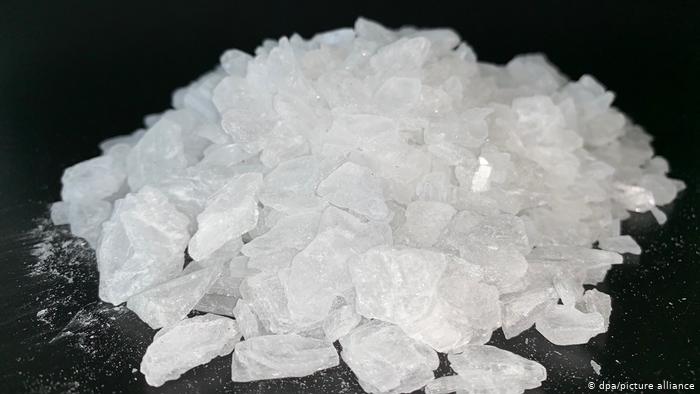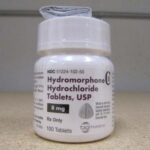Methamphetamine: Uses, Side Effects, Abuse, Addiction

What is methamphetamine?
Methamphetamine is a very powerful and potent central nervous system stimulant that is mainly used as a recreational drug and less commonly as a second-line treatment for attention deficit hyperactivity disorder and obesity. Crystal methamphetamine is a form of the drug that looks like glass fragments or shiny, bluish-white rocks.
It is chemically similar to amphetamine, a drug used to treat attention-deficit hyperactivity disorder (ADHD) and narcolepsy, a sleep disorder. Other common names for methamphetamine include blue, crystal, ice, meth, and speed. Crystal methamphetamine is a Schedule II substance under the Controlled Substances Act. Schedule II drugs, which include cocaine and PCP, have a high potential for abuse. Abuse of these drugs may lead to severe psycho-logical or physical dependence.
Is methamphetamine addictive?
Yes, methamphetamine is highly addictive. When people stop taking it, withdrawal symptoms can include:
- anxiety
- fatigue
- severe depression
- psychosis
- intense drug cravings
How do people use methamphetamine?
People can take methamphetamine by:
- smoking
- swallowing (pill)
- snorting
- injecting the powder that has been dissolved in water/alcohol
Because the “high” from the drug both starts and fades quickly, people often take repeated doses in a “binge and crash” pattern. In some cases, people take methamphetamine in a form of binging known as a “run,” giving up food and sleep while continuing to take the drug every few hours for up to several days.
How does methamphetamine affect the brain?
Methamphetamine increases the amount of the natural chemical dopamine in the brain. Dopamine is involved in body movement, motivation, and reinforcement of rewarding behaviors. The drug’s ability to rapidly release high levels of dopamine in reward areas of the brain strongly reinforces drug-taking behavior, making the user want to repeat the experience.
Short-Term Effects
Taking even small amounts of methamphetamine can result in many of the same health effects as those of other stimulants, such as cocaine or amphetamines. These include:
- increased wakefulness and physical activity
- decreased appetite
- faster breathing
- rapid and/or irregular heartbeat
- increased blood pressure and body temperature
What are other health effects of methamphetamine?
People who inject methamphetamine are at increased risk of contracting infectious diseases such as HIV and hepatitis B and C. These diseases are transmitted through contact with blood or other bodily fluids that can remain on drug equipment. Methamphetamine use can also alter judgment and decision-making leading to risky behaviors, such as unprotected sex, which also increases risk for infection.
Methamphetamine use may worsen the progression of HIV/AIDS and its consequences. Studies indicate that HIV causes more injury to nerve cells and more cognitive problems in people who use methamphetamine than it does in people who have HIV and don’t use the drug. Cognitive problems are those involved with thinking, understanding, learning, and remembering.
Long-term methamphetamine use has many other negative consequences, including:
- extreme weight loss
- addiction
- severe dental problems (“meth mouth”)
- intense itching, leading to skin sores from scratching
- anxiety
- changes in brain structure and function
- confusion
- memory loss
- sleeping problems
- violent behavior
- paranoia—extreme and unreasonable distrust of others
- hallucinations—sensations and images that seem real though they aren’t
In addition, continued methamphetamine use causes changes in the brain’s dopamine system that are associated with reduced coordination and impaired verbal learning. In studies of people who used methamphetamine over the long term, severe changes also affected areas of the brain involved with emotion and memory. This may explain many of the emotional and cognitive problems seen in those who use methamphetamine.
Although some of these brain changes may reverse after being off the drug for a year or more, other changes may not recover even after a long period of time. A recent study even suggests that people who once used methamphetamine have an increased risk of developing Parkinson’s disease, a disorder of the nerves that affect movement.
How quickly do the effects of methamphetamine manifest?
The effects of methamphetamine can manifest relatively quickly after taking the drug, usually within minutes to hours, depending on the route of administration. Here is a general timeline of the effects:
1. Immediate effects (minutes to seconds): When methamphetamine is smoked or injected intravenously, the user experiences an intense rush or “flash” that occurs within seconds. This is followed by a surge of euphoria, increased energy, and heightened focus.
2. Short-term effects (hours): The initial rush is typically followed by several hours of an intense high. During this time, users may experience increased wakefulness, decreased appetite, a sense of well-being, increased confidence, hyperactivity, talkativeness, and increased sexual drive. Physical symptoms can include dilated pupils, increased heart rate, elevated blood pressure, and increased body temperature.
3. Longer-term effects (hours to days): As the initial high wears off, users may experience a “crash” characterized by exhaustion, depression, anxiety, irritability, and intense cravings for more methamphetamine. These symptoms can last for several hours or up to a few days.
It’s important to note that the duration and intensity of methamphetamine’s effects can vary based on factors such as the dose taken, the individual’s tolerance, and the purity of the drug. Regular methamphetamine use can lead to tolerance, requiring higher doses to achieve the desired effects, which increases the risk of dependence and addiction.
Methamphetamine abuse can have serious long-term consequences on physical and mental health. It is crucial to seek professional help if you or someone you know is struggling with methamphetamine use.
How to overcome methamphetamine abuse
Overcoming methamphetamine abuse can be challenging, but with the right approach and support, it is possible to recover and lead a healthier life. Here are some steps you can take to overcome methamphetamine abuse:
1. Acknowledge the problem: Recognize that you have a problem with methamphetamine abuse and make a commitment to change. Acceptance is an important first step toward recovery.
2. Seek professional help: Consult a healthcare professional, such as a doctor, therapist, or addiction counselor, who can provide guidance and support throughout your recovery journey. They can help create a personalized treatment plan based on your needs.
3. Detoxification: Methamphetamine detoxification is the process of safely managing withdrawal symptoms as the drug leaves your system. It is often recommended to undergo this process under medical supervision to ensure safety and minimize discomfort.
4. Therapy and counseling: Participate in individual therapy or counseling sessions to address the underlying causes of addiction and develop coping strategies. Cognitive-behavioral therapy (CBT) is commonly used to help individuals change harmful patterns of thinking and behavior.
5. Support groups: Join a support group, such as Narcotics Anonymous (NA), where you can connect with others who have faced similar challenges. Sharing experiences and receiving support from peers can be incredibly helpful during recovery.
6. Develop healthy coping mechanisms: Find alternative ways to cope with stress and emotional difficulties. Engage in activities that bring you joy and promote your overall well-being, such as exercise, hobbies, mindfulness, or creative outlets.
7. Create a supportive environment: Surround yourself with positive influences and distance yourself from people, places, or situations that may trigger drug use. Build a support network of family and friends who understand your goals and can provide encouragement.
8. Address co-occurring disorders: If you have any co-occurring mental health disorders, such as depression or anxiety, it is important to receive proper treatment for these conditions as they can contribute to substance abuse.
9. Practice self-care: Focus on taking care of yourself physically, mentally, and emotionally. Get adequate sleep, eat a balanced diet, and engage in activities that promote relaxation and self-reflection.
10. Stay committed and be patient: Recovery is a journey that takes time and effort. There may be setbacks along the way, but stay committed to your goals and believe in your ability to overcome methamphetamine abuse.
Remember, seeking help and having a support system in place is crucial for successful recovery. Reach out to professionals and loved ones who can offer assistance, and don’t hesitate to ask for help when needed.




